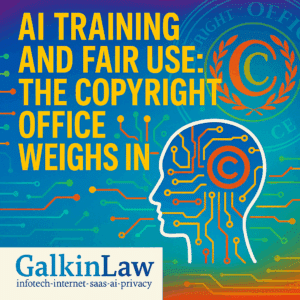
On May 9, 2025, the U.S. Copyright Office released examining whether using copyrighted content to train generative AI models qualifies as “fair use” under U.S. law.
This report was apparently the reason for the recent dismissal of Shira Perlmutter, the Register of Copyrights, by the Trump administration.
Perlmutter’s stance emphasized that unauthorized use of copyrighted materials for AI training likely exceeds fair use boundaries and poses risks to creators’ rights.
Her removal has been criticized by IP lawyers and lawmakers as undermining the independence of the Copyright Office and favoring tech industry interests.
📚 Key Legal Takeaways from the Report
The Office makes one thing clear: there’s no blanket fair use defense for AI training.
✅ Transformative use?
The report says that merely using works to train a model doesn’t automatically meet the standard, especially if the output competes with or mimics the original.
✅ Commercial vs. research use:
Training for internal research may lean fair, but commercial model training – especially for tools that generate text, images, or music – is likely not protected.
✅ Market harm matters:
If AI output displaces the market for the original work, that strongly cuts against fair use. This is a major concern for publishers, musicians, and visual artists.
⚖️Why It Matters
The Copyright Office doesn’t make law – but its guidance holds real legal weight. Courts often defer to its views in complex IP cases, and this report is likely to influence how judges evaluate upcoming lawsuits against OpenAI, Meta, and others.
It also sets the stage for possible future legislation or federal rulemaking on AI copyright exceptions.
⚖️ What’s Still Unclear?
The report avoids hard lines. It doesn’t say AI training always violates copyright, but it shifts the burden to AI companies to justify their use case. It also leaves open the idea of voluntary licensing or collective rights management – both of which could reshape how AI models are developed in the U.S.
For a deeper dive, access the full report here:
Contact a Galkin Law lawyer to discuss your AI legal issues
hashtagCopyrightLaw hashtagAIandLaw hashtagGenerativeAI hashtagFairUse hashtagLegalTech
